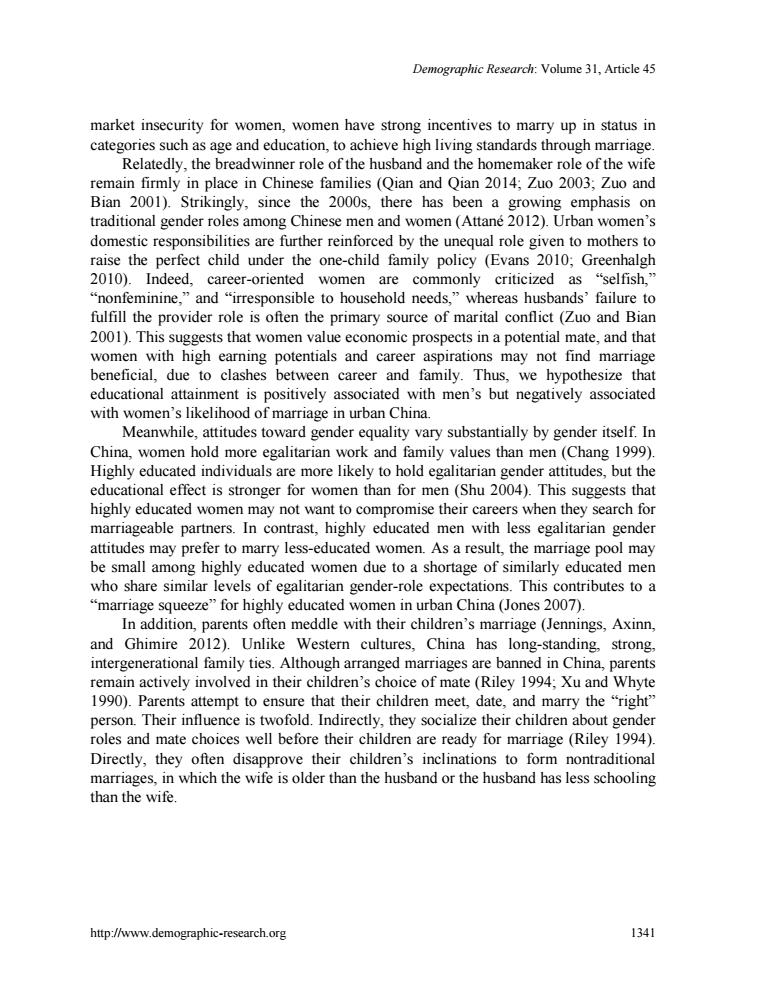正在加载图片...

Demographic Research:Volume 31,Article 45 market insecurity for women,women have strong incentives to marry up in status in categories such as age and education,to achieve high living standards through marriage. Relatedly,the breadwinner role of the husband and the homemaker role of the wife remain firmly in place in Chinese families(Qian and Qian 2014;Zuo 2003;Zuo and Bian 2001).Strikingly,since the 2000s,there has been a growing emphasis on traditional gender roles among Chinese men and women (Attane 2012).Urban women's domestic responsibilities are further reinforced by the unequal role given to mothers to raise the perfect child under the one-child family policy (Evans 2010;Greenhalgh 2010).Indeed,career-oriented women are commonly criticized as "selfish," “nonfeminine,.”and“irresponsible to household needs,”whereas husbands'failure to fulfill the provider role is often the primary source of marital conflict(Zuo and Bian 2001).This suggests that women value economic prospects in a potential mate,and that women with high earning potentials and career aspirations may not find marriage beneficial,due to clashes between career and family.Thus,we hypothesize that educational attainment is positively associated with men's but negatively associated with women's likelihood of marriage in urban China. Meanwhile,attitudes toward gender equality vary substantially by gender itself.In China,women hold more egalitarian work and family values than men (Chang 1999). Highly educated individuals are more likely to hold egalitarian gender attitudes,but the educational effect is stronger for women than for men(Shu 2004).This suggests that highly educated women may not want to compromise their careers when they search for marriageable partners.In contrast,highly educated men with less egalitarian gender attitudes may prefer to marry less-educated women.As a result,the marriage pool may be small among highly educated women due to a shortage of similarly educated men who share similar levels of egalitarian gender-role expectations.This contributes to a "marriage squeeze"for highly educated women in urban China (Jones 2007). In addition,parents often meddle with their children's marriage(Jennings,Axinn, and Ghimire 2012).Unlike Western cultures,China has long-standing,strong, intergenerational family ties.Although arranged marriages are banned in China,parents remain actively involved in their children's choice of mate(Riley 1994;Xu and Whyte 1990).Parents attempt to ensure that their children meet,date,and marry the"right" person.Their influence is twofold.Indirectly,they socialize their children about gender roles and mate choices well before their children are ready for marriage (Riley 1994). Directly,they often disapprove their children's inclinations to form nontraditional marriages,in which the wife is older than the husband or the husband has less schooling than the wife. http://www.demographic-research.org 1341Demographic Research: Volume 31, Article 45 http://www.demographic-research.org 1341 market insecurity for women, women have strong incentives to marry up in status in categories such as age and education, to achieve high living standards through marriage. Relatedly, the breadwinner role of the husband and the homemaker role of the wife remain firmly in place in Chinese families (Qian and Qian 2014; Zuo 2003; Zuo and Bian 2001). Strikingly, since the 2000s, there has been a growing emphasis on traditional gender roles among Chinese men and women (Attané 2012). Urban women‟s domestic responsibilities are further reinforced by the unequal role given to mothers to raise the perfect child under the one-child family policy (Evans 2010; Greenhalgh 2010). Indeed, career-oriented women are commonly criticized as “selfish,” “nonfeminine,” and “irresponsible to household needs,” whereas husbands‟ failure to fulfill the provider role is often the primary source of marital conflict (Zuo and Bian 2001). This suggests that women value economic prospects in a potential mate, and that women with high earning potentials and career aspirations may not find marriage beneficial, due to clashes between career and family. Thus, we hypothesize that educational attainment is positively associated with men‟s but negatively associated with women‟s likelihood of marriage in urban China. Meanwhile, attitudes toward gender equality vary substantially by gender itself. In China, women hold more egalitarian work and family values than men (Chang 1999). Highly educated individuals are more likely to hold egalitarian gender attitudes, but the educational effect is stronger for women than for men (Shu 2004). This suggests that highly educated women may not want to compromise their careers when they search for marriageable partners. In contrast, highly educated men with less egalitarian gender attitudes may prefer to marry less-educated women. As a result, the marriage pool may be small among highly educated women due to a shortage of similarly educated men who share similar levels of egalitarian gender-role expectations. This contributes to a “marriage squeeze” for highly educated women in urban China (Jones 2007). In addition, parents often meddle with their children‟s marriage (Jennings, Axinn, and Ghimire 2012). Unlike Western cultures, China has long-standing, strong, intergenerational family ties. Although arranged marriages are banned in China, parents remain actively involved in their children‟s choice of mate (Riley 1994; Xu and Whyte 1990). Parents attempt to ensure that their children meet, date, and marry the “right” person. Their influence is twofold. Indirectly, they socialize their children about gender roles and mate choices well before their children are ready for marriage (Riley 1994). Directly, they often disapprove their children‟s inclinations to form nontraditional marriages, in which the wife is older than the husband or the husband has less schooling than the wife